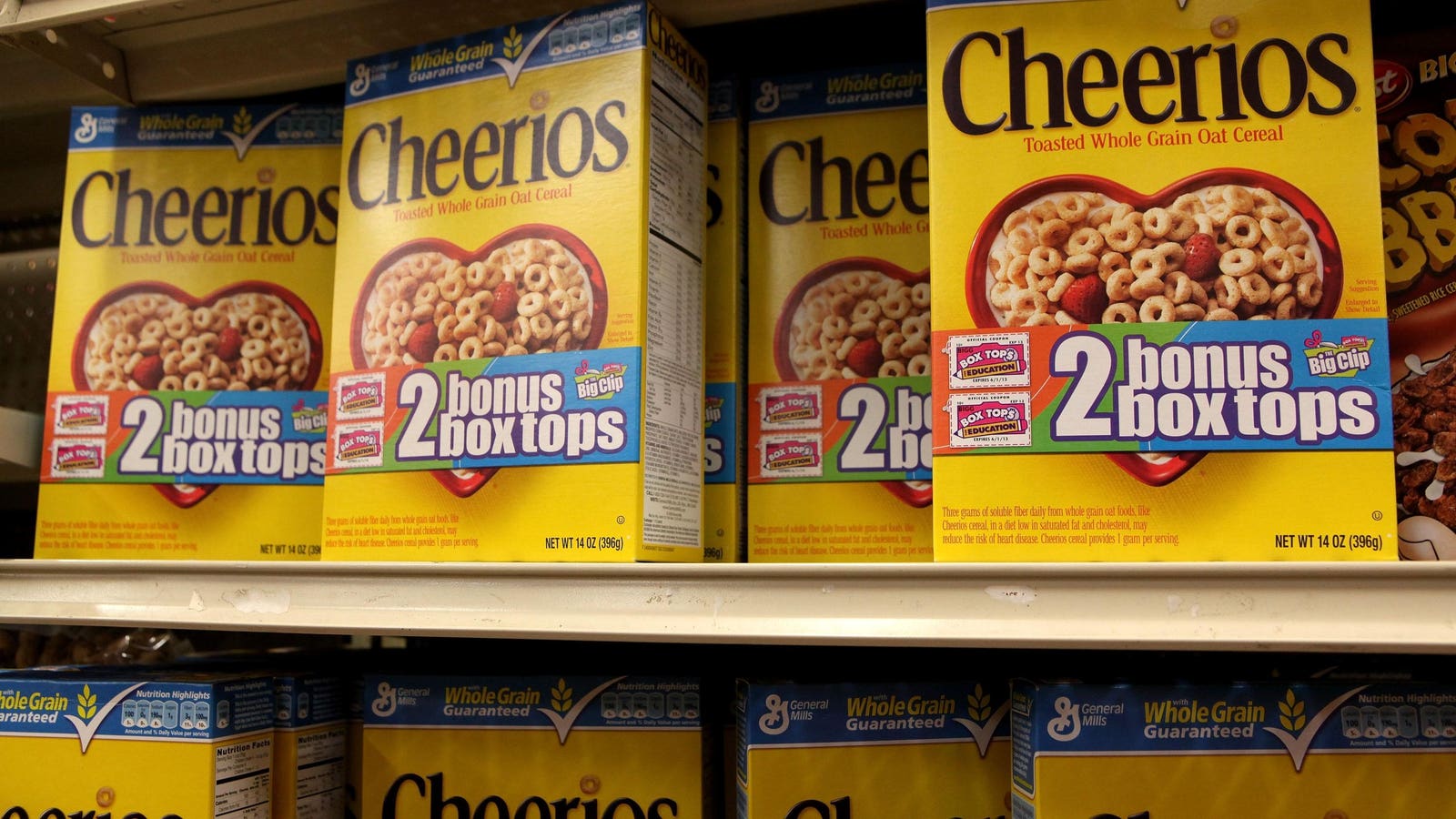Around 80% of Americans have been exposed to the plant pesticide chlormequat, which causes fertility and growth issues in animals, according to a new study published Thursday…
Fantastic. I ate that almost exclusively for years because I thought it was the healthier option.
You’ll be fine. This is one of the regular studies that doesn’t use humans, but rather creatures that evolved similar (but not the same) systems as humans, that the media picks up to regularly scare people.
Cheerios are turning the frogs gay though.
That’s why they all look so fabulous.
“Don’t worry baby, I brought protection”
(Opens a ziplock bag of Cheerios)
Getting crumbs in my bed is a surefire way of ending any coital activities, so… Mission achomlished?
Referring to it as “coital activities” is also a good way to shut things down.
Don’t be fatuous, Jeffrey.
Ladies love a cunning linguist with a massive… vocabulary.
Honey, if crumbs are your hard limit, referring to it as “coital activities” is entirely appropriate and I hope you meet the Mormon of your dreams.
This is the second time I’ve seen someone incorrectly refer to chlormequat as a pesticide. It’s not a pesticide, it’s a chemical that encourages plants to grow thicker stems, which in turn makes harvesting easier.
I don’t say this to defend its use. I just feel that it’s important to call it what it is.
Would that qualify as a fertilizer, providing something the plant needs for its stems, or some sort of hormone that encourages plant stem growth, or something else?
Chlormequat is a “plant growth regulator.” It prevents the plant from creating a hormone that would otherwise cause the plant’s stems to elongate and thin. Falls into the “something else” category, imo.
Edit: I think that some plant growth regulators are hormones, but not all. I should note that I’m not an expert, I just like to look chemicals up on Wikipedia (and the linked sources) and noticed that a lot of journalists were getting this wrong.
I can’t stand living in this country sometimes.
How does this shit continue to fucking happen year after year decade after decade.
Greed. It happens because of selfish greedy people who care about nothing but making themselves richer.
Interestingly enough, the US does not allow American farmers to use chlormequat on domestic food. That said, the loophole is that US food producers are allowed to import crops grown with it.
And although most US grain is grown domestically, the US gets a shitload of oats from Canada, and Canada still sprays this crap on crops. The UK is also shady with this stuff.
Now we’re getting somewhere, very interesting
It happens because consumers insist on buying and eating processed shit like this decade after decade. In what world were Cheerios considered a healthy option?
They’re supposed to be a whole grain simple cereal. They’ve also marketed it as such and doctors recommend them for simple diets (or have in the past for me, maybe that’s changed)
In what world were cheerios considered “going to give you fucking reproductive issues”
Fuck outta here with your attitude
I guess it brings into question what is true and what is just blatantly made-up. Cheerios being a healthy alternative was only true because the box said so, because the commercials said so, because the “doctors” supposedly said so. When in reality, eating eggs or some kind of lean protein, greens and a piece of whole wheat toast would be a substantially healthier breakfast.
People don’t like being told they were lied too and their ‘thoughts on reality’ are wrong. The amount of premade garbage people buy thinking is healthy is astonishing.
I eat processed foods, living in the States it’s nearly impossible to avoid. But I also don’t look at Cheerios and think they actually improve heart health, or that they provide any sort of nutritional benefit that any other cereal wouldn’t. It’s much more convenient for people to just believe what a box says instead of comparing the product to any other product on offer, or better yet reconsidering how healthy breakfast cereal is in general.
deleted by creator
deleted by creator
Unprocessed wouldn’t help in this case. Would need to be certified organic.
From this day forward, using Cheerios as birth control will be called “busting a honey nut.”
deleted by creator
Heart healthy and a birth control? Harvey Kellogg eat your heart out.
I wonder if it stops kids masturbating too.
Confused. Is it unhealthy to continue using the cheerios as a cock ring or not?
Get outta here with your big dick humble bragging.
Chlormequat- sounds like a MAGA approved miracle injection to me.
It looks like organic products mostly avoid this.
- 11/12 (92%) of conventional oat-based products had it
- 1/8 (12.5%) of organic oat-based products had it
(from https://www.nature.com/articles/s41370-024-00643-4/tables/2 )
Of course, they just use more of different pesticides.
Are you saying that organic oat-based products use more pesticides than conventional oat-based products? Or are you talking about organic products in general? In either case, I’d be interested in learning more if you have any good sources.
In general, organic foods don’t contain less pesticide residue.
For the layman:
For the scientific reader:
I upvoted. Thanks for providing sources. I read both. My takeaway is that the amount of pesticide residue on conventional products is considered safe, but organic products contain less pesticide residue.
I think that Scientific American article is low quality in general (which is a shame–I used to subscribe to them). I think the relevant part is this quote:
According to the National Center for Food and Agricultural Policy, the top two organic fungicides, copper and sulfur, were used at a rate of 4 and 34 pounds per acre in 1971 [1]. In contrast, the synthetic fungicides only required a rate of 1.6 lbs per acre, less than half the amount of the organic alternatives.
- Their reference is https://ncfap.org/, which leads to a broken website for me.
- It’s talking about usage of two specific fungicides from over 50 years ago.
(The article has other red flags as well that suggest lack of rigor.)
The paper seems more rigorous to me, but it actually refutes your point:
While conventional produce was between 2.9 and 4.8 times more likely to contain detectable pesticide residues than organic produce, samples of organic produce frequently contained residues.
That said, I think the important point is that both organic and conventional food are considered safe. Both papers agree with that, as does Harvard Health, which I consider reputable, although it also says that organic produce has less pesticide residue:
According to USDA data, organic foods have fewer pesticide residues than conventionally grown produce. But the amounts for both types of produce are within the level for safe consumption. And it’s unclear if the pesticides used in organic farming are safer than nonsynthetic pesticides used in conventional farming.
(from https://www.health.harvard.edu/staying-healthy/should-you-go-organic )
Perhaps you would consider editing your original post to get rid of the “more of”?
They do because the organic approved pesticides are less effective. They tend to use more of them and the crop yields are still lower. Although I have not heard of them causing major fertility issues or colony collapse so it’s give and take.
Don’t Panic, Go Organic!
Looks like Quaker Oats farmers were following the law so I really can’t blame them. Just need to get the law changed again
Cheerios has got to be the the blandest cereal in the solar system, right next to bran flakes.
Not just mice, they also tested in pigs - with various degrees of effect. The alarming thing is how pervasive it is in humans.
Sure, but mice and pigs are not humans, which is the point. They evolved to sometimes have different reactions to the same chemicals that we have reactions to. It could very well be that this pesticide does not pose a risk to humans.
And honestly, we have to have pesticides to feed a hungry world. And herbicides. Especially herbicides, as increasing CO2 in the atmosphere will cause a ‘global greening’ effect as well as a greenhouse effect, which will result in stronger and hardier weeds. We just can’t risk massive crop failures anymore. I don’t like it any more than you do, but there really isn’t another solution. Especially if you want people to stop eating so much meat.
Okay then what is a suitable animal to test on?
But pesticides and herbicides are also breeding less robust crops. E.g. corn doesn’t need something to discourage bugs or competitive plants, so it slowly loses that ability. And maybe it slowly loses some of nutrients we want on the way.
Besides which, isn’t the point that we humans learn to fit into the ecosystem?
It’s not that the animals aren’t suitable to test it on. It’s fine to do preliminary safety tests with animals. The problem is that the media runs with the story before it’s also tested on humans as if reactions in mice will always be the same as reactions in people, when they often are not.
“Hey we’re conducting a study to see if this stuff is fatal or alters your hormones, who wants to be first?”
Whether or not you find the idea of such a study ethical, it doesn’t make the animal studies any more accurate as to how they affect humans.
Imagine if we didn’t know whether or not chocolate was safe and tested it out by giving it to dogs.
Does that illustrate the problem better?
Removed by mod
Absolutely. And if that study shows there is a problem, then it is time for concern.
Nonono, we need to not use horrible fertilizers and pesticides, and when the land is mined out from low-productivity farming on marginal soils, we just clear more old-growth forest to keep up for a few more years. And when we’re out of rainforest, the first people affected by sky-high food prices will be poor brown people, not westerners, so that’s fine.
if you’re still eating cereal in current year it’s on you
Ate oatmeal cookies last week that were made with Quaker Oats… haven’t eaten cereal in a long time.
deleted by creator
Surprised it isn’t cornflakes but I’ve still got to ask: what’s the venn diagram between people who eat Quaker Oats and people who fuck? It’s got to be in the single digits.
I’m curious what it is that you eat which influences what makes you fuckable.
Also, on which date do you tell someone that you eat Quaker Oats as a warning?
Lemmy has told me the answer to your first question is ass.
People really shouldn’t get their nutrition facts from the human centipede movies.
You’re forgetting that Trey Parker and Matt Stone made an animated documentary on the subject.
Removed by mod











